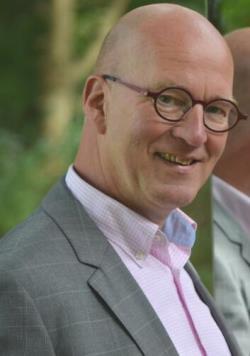Agile is a Mindset
Interview with Henny Portman
Advisor, Coach, Agile Thought Leader
Portman PM(O) Consultancy
The Netherlands

Interviewed by Yu Yanjuan
Journalist, Project Management Review: PMR (China)
International Correspondent, PM World Journal
Introduction to the interviewee
Henny Portman is owner of Portman PM(O) Consultancy and partner of HWP Consulting. He has 40 years of experience in the project management domain. He was the project management office (PMO) thought leader within NN Group and responsible for the introduction and application of the PMO methodologies (portfolio, programme and project management) across Europe and Asia. He trains, coaches and directs (senior) programme, project and portfolio managers and project sponsors at all levels, and has built several professional PM(O) communities.
He is an accredited P3O, PRINCE2, MSP, MoP, PRINCE2 Agile, AgilePM, AgilePgM, and AgileSHIFT trainer and a SPC4 SAFe consultant and trainer too. He is a P3M3 trainer and assessor and PMO Value Ring Certified Consultant. On behalf of the IPMA, he assesses (large and mega) projects for the Project Excellence Award. In addition, Henny is an international speaker and author of many articles and books in the PM(O) field and blogger (hennyportman.wordpress.com). Henny can be contacted at henny.portman@gmail.com.
Interview
About Agile
Q1. Having read your profile, I’m impressed by the word “Agile”, which exists with the highest frequency. How do you define “Agile”? How to decide how Agile a project should be?
Henny Portman (Portman): For me, ‘Agile’ is a mindset. This means whether it is a traditional project or an Agile project, you are running a project and use the Agile mindset to determine how much Agile practices can be applied to deliver a more successful project. Take some of the Agile principles for example: frequent delivery and maximizing the amount of work not done. This means you deliver a part of your service or product to your customer and ask for feedback. Based on the feedback, you can delete some requested requirements or adjust the product and create an even better product. If you prioritize your requirements and start with the most important ones, you could stop at the time agreed and not deliver the less important ones. But this is not always possible. If you have to build a bridge, the frequent delivery/feedback will not be possible, and I hope all safety related requirements will not be skipped due to an agreed delivery date.
Q2. What is your book ‘scaling Agile’ mainly about?
Portman: Two-fold. Firstly, I look at the project organization and follow a journey where I start with one individual permanent Agile team using e.g. Scrum and I am adding more and more of these kind of teams. Then I ask myself if there is still a role for a project manager when there is both a product owner and scrum master. You can imagine that when having one or a few teams the project manager is just overhead but if there are a lot of teams you need someone who oversees the dependencies between the teams, who understands which team needs to start first with what, etc. This could be a project manager but there are scaling Agile frameworks especially designed for these tasks too and then you don’t need a project manager. Look for example at SAFe or LeSS.
Agile frameworks are the second part of the book. I explain in detail the most commonly used Agile ways of working. Think about Scrum, Kanban, lean, SAFe, Nexus, Scrum at Scale, LeSS, Disciplined Agile, Spotify model, PRINCE2 Agile, AgilePM and AgileSHIFT. Besides these ways of working, I have a separate chapter where I explain in less detail other Agile ways of working.
Q3. You’ve written an article titled “Culture Makes or Breaks Your Agile Transition”. So what role does culture play in Agile transition?
More…
To read entire interview, click here
Editor’s note: This interview was first published in PMR, Project Management Review magazine, China. It is republished here with the permission of PMR. The PM World Journal maintains a cooperative relationship with PMR, periodically republishing works from each other’s publications. To see the original interview with Chinese introduction, visit PMR at http://www.pmreview.com.cn/english/
How to cite this interview: PMR (2021). Agile is a Mindset: Interview with Henny Portman; Project Management Review; republished in the PM World Journal, Vol. X, Issue V, May. Available online at https://pmworldlibrary.net/wp-content/uploads/2021/05/pmwj105-May2021-Yanjuan-Interview-with-Henny-Portman.pdf
About the Interviewer

Yu Yanjuan
Beijing, China
![]()
Yu Yanjuan (English name: Spring), Bachelor’s Degree, graduated from the English Department of Beijing International Studies University (BISU) in China. She is now an English-language journalist and editor working for Project Management Review (PMR) Magazine and website. She has interviewed over sixty top experts in the field of project management. Before joining PMR, she once worked as a journalist and editor for other media platforms in China. She has also worked part-time as an English teacher in training centers in Beijing. Beginning in January 2020, Spring also serves as an international correspondent for the PM World Journal.
For work contact, she can be reached via email yuyanjuan2005@163.com or LinkedIn https://www.linkedin.com/in/yanjuanyu-76b280151/.
To view other works by Spring, visit her author showcase in the PM World Library at https://pmworldlibrary.net/authors/yu-yanjuan/









